The Best Arm Workouts for Beginners, With Dumbbells, and More
Arm training gets a bad rap as being “all show, no go.” That mindset ignores the full range of benefits that come with training these essential muscle groups (in addition to a building good-looking pair of arms).
Want to bring up your bench press? A strong set of horseshoe triceps will help you when locking out the weight. If you struggle with pull-ups, underdeveloped biceps may be holding you back.
Whether you are just beginning your training journey, have been hitting the gym for years, or have no equipment at all but still want great results, you can find the perfect arm workout to get you closer to those goals. Dive in, choose your plan of attack, and get working.
The Best Arm Workouts
- Best Bodyweight Arm Workout
- Best Arm Workout for Beginners
- Best Arm Workout With Dumbbells
- Best Muscle-Building Arm Workout
Best Bodyweight Arm Workout
Bodyweight training may not seem like a popular option to consider, but focusing on bodyweight movements can translate into improved body awareness, better muscular coordination, and more exercise options once you start to add weight in the gym.
The Arms Mastery Bodyweight Workout
This workout is designed to be simple and effective. Get stronger, improve muscle coordination, and feel a pump that you never thought could be possible with just your bodyweight.
You will perform two exercises in a superset fashion with the inclusion of the “contrast training method.” Contrast training is when you start a set using a slow-and-controlled rep speed and finish the set performing reps explosively. This contrasting tempo recruits more muscle fibers, which leads to increased power output and an increased stimulus for muscle growth.
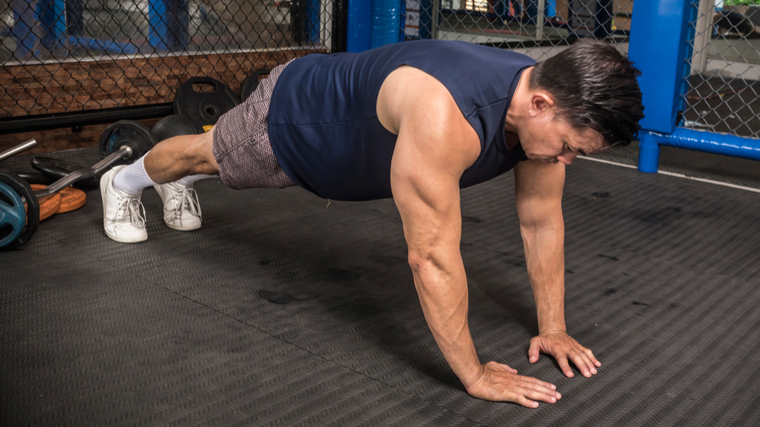
Tempo is indicated by a series of four numbers. The first number addresses the speed for lowering the weight (stretching the muscle), the second number refers to any pause in the stretched position, the third number is the speed to raise the weight (contracting the muscle), and the fourth number covers any pause in the contracted position. The third number, in particular, may sometimes be an “X” instead of an actual number. This means the movement should be performed as quickly as possible. Think of the “X” as “explosive”.
For example, using the contrast training method, perform the first six to eight reps working at a 5-0-1-0 tempo — take five seconds to lower the weight (yourself, in this case). Take no rest before immediately raising the weight for one second. Lockout but do not rest at the top before beginning the next repetition. For the next six to eight reps of the same set, you will use a 2-0-x-0 tempo — two seconds to lower, no rest, as fast as possible upwards, and then no rest at the top position.
The amount of reps in this bodyweight workout may not seem too difficult at first, but take into account the total time under tension. The first half of your set can take more than 45 seconds followed by another 20+ seconds, resulting in more than one intense minute for each set.
Diamond Push-up
- How to Do it: Support your body on your toes and hands. Set your hands directly underneath your chest to create a triangle or “diamond” shape with your thumbs and index fingers. Your hands do not need to be touching. Keeping them a few inches apart may be more comfortable for your wrist and elbow joints. Maintain a straight line from your neck to your ankles during each rep. Bend your elbows to lower your entire body. Press to full lockout. Allow your elbows to sit roughly at a 45-degree angle towards your body.
- Sets, Reps, Tempo: 4 x 12-16 using contrast training. Each set should be 6-8 reps at 5-0-1-0 tempo followed by 6-8 reps at 2-0-X-0 tempo.
- Rest time: 60 seconds before moving to the next exercise.
Inverted Biceps Curl With Towel
- How to Do it: Wrap a sturdy towel around any fixed object that can support your bodyweight, such as a rail, staircase, or fence. Grab the towel with your thumbs up and the material running out of the pinky-side of the hand. Shift your weight onto your heels. A lower body angle will be more challenging, so adjust the towel length and position your body accordingly. Flex your biceps and curl to pull yourself up. Supinate your wrists (rotate your palms towards you) as you come to the last quarter of the contraction. Your palms should end up directly in front of your face.
- Sets, Reps, Tempo: 4 x 12-16 using contrast training. Each set should be 6-8 reps at 5-0-1-0 tempo followed by 6-8 reps at 2-0-X-0 tempo.
- Rest time: 60 seconds before moving back to diamond push-ups.
Best Arm Workout For Beginners
So you are just starting your fitness journey. That’s good. But you might be thinking the way to a bigger, stronger, and more functional set of arms is all about getting as pumped as possible. Nope.
It’s important to understand that you cannot rush this process and, much like the larger muscle groups that most trainees dedicate time to, improving the arms should be no different.
The biceps and triceps receive a portion of the tension in almost every exercise involving the chest or back. This indirect work should still be counted towards your overall weekly “arm training” volume. It is also important to understand that, in the initial weeks of starting any new program, you will see an improvement in neuromuscular adaptations before muscle growth can occur. (1)
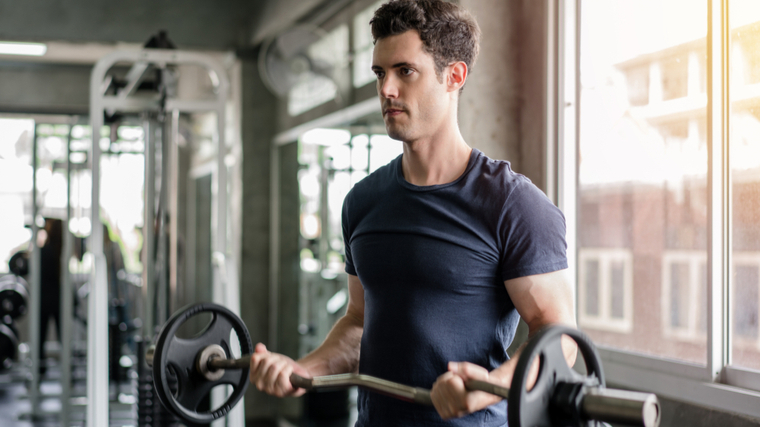
Essentially, when you begin a new workout routine, your brain “learns” how to efficiently use various muscles during an exercise before your body can “tell” those muscles to respond to training by growing larger. When your body is more efficient at using specific muscles, your training plan can become more productive.
This means it would be wise to spend time perfecting these exercises to better serve you in later cycles of training. Because most people work on their larger muscle groups at the start of the week, it makes sense to use this arm workout at the end of the week.
This beginner workout focuses on recruiting the biceps and triceps with simple and effective exercises. This allows you to develop a mind-muscle connection (learning to feel the specific muscles working), reinforces strict form on fundamental movements, and targets the body parts to build a foundation of size and strength.
Close-Grip Bench Press
- How to Do it: Take a slightly inside shoulder-width grip. Lower the bar in-line with your mid-chest. Do not aim to keep your elbows tucked in, but allow them to sit naturally or at a 45-degree angle with your forearms perpendicular to the floor. Touch the bar to your chest at the bottom. Reach full lockout before lowering the bar.
- Sets, Reps, Tempo: 4 x 6-8 at 4-0-X-0 tempo.
- Rest time: 60 seconds before moving onto the next exercise.
Medium-Grip EZ-Bar Curl
- How to Do it: Keep your feet flat and grasp the bar with a palms-up grip. Keep your shoulder blades retracted as you brace your abdominal wall. Keep your upper arms perpendicular to the floor. Every rep should start with the muscle fully stretched at the bottom and end fully contracted at the top.
- Sets, Reps, Tempo: 4 x 6-8 at 4-0-X-0 tempo.
- Rest time: 60 seconds before moving back to the first exercise.
Cable Triceps Extension With Rope
- How to Do it: Face a cable high-pulley with a rope attachment. Grab the rope with both hands and take one or two steps back. Maintain a strong, stable upright position. Set your upper arms in place, gently touching the sides of your body. Keep your elbows in position and do not let them move forward or back. As you start the movement by pressing your hands down, think of flexing your triceps to move the weight.
- Sets, Reps, Tempo: 3 x 10-12 at 3-0-1-1 tempo.
- Rest time: 60 seconds before moving to the next exercise.
Cable Hammer Curl With Rope
- How to Do it: Face a cable low-pulley with a rope attachment at the bottom. Grab the rope with a thumbs-up grip and take one or two steps back. Maintain a strong, stable position. Your upper arms should be set in place with your elbows angling slightly outwards. Do not allow your arms to flail as you curl the weight upwards.
- Sets, Reps, Tempo: 3 x 10-12 at 3-0-1-1 tempo.
- Rest time: 60 seconds before moving back to the previous exercise.
Best Arm Workout With Dumbbells
Whether you can’t make it into the gym or you don’t have a gym membership, no problem. You can still build a respectable set of arms. All you need is a few sets of dumbbells and an adjustable bench.
The Dumbbell-Only Workout for Arm Size
Training with dumbbells can be a great way to spot any lack of strength or coordination from one arm to the other. Requiring the body to move two weights separately in a single coordinated exercise will reveal, for example, if one arm has been under-stimulated by standard exercises or if one side has been overcompensating for the other during specific movements.
It’s not uncommon for one arm to reach muscular failure before it’s opposite side, typically the non-dominant side (right-handed people tend to have weaker left sides and vice versa.). When this happens, end the set when one side reaches failure even if the opposite side is not fully fatigued. This allows the weaker side to eventually “catch up” in development and reduce the discrepancy.
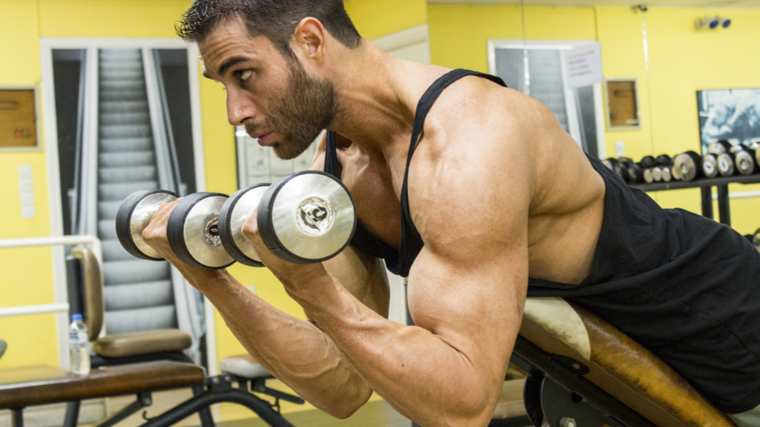
Switching to dumbbells is also a great way to take the pressure off your joints if you get pain when performing the same exercises with a barbell. Dumbbells allow your wrists and elbows to adjust slightly during any given exercise, while a barbell requires your hands to stay in a static position during an exercise, which can sometimes contribute to joint strain.
Single-Arm Skull Crusher
- How to Do it: Lie on a flat bench as if performing a standard dumbbell bench press, with a dumbbell in only one hand. Keep your elbow pointed directly up to the ceiling. Lower the weight until your arm is fully stretched and the dumbbell is touching the top of your shoulder on the same side (right hand lowers to right shoulder, left to left).
- Sets, Reps, Tempo: 3 x 8-10 at 3-1-1-0 tempo.
- Rest time: No rest between sides, 45 seconds before moving to the next exercise.
Dumbbell Spider Curl
- How to Do it: Set the bench to a high-incline angle. Lie with your chest on the top of the bench. Curl both weights while keeping your your hands supinated (palms facing up). During the movement, do not allow your elbows to shift back towards your body. Be sure to hold an isometric contraction at the top position.
- Sets, Reps, Tempo: 3 x 8-10 at 3-0-1-2 tempo.
- Rest time: 60 seconds before moving back to the previous exercise.
Dumbbell French Press
- How to Do it: While standing, raise one dumbbell over your head with both hands. Your hands should be placed against the top weight plate with your palms facing the ceiling. Be sure to pause in the stretched position before raising the weight. Keep your elbows stationary during the movement. Raise and lower the weight by bending only at the elbows, not pressing with the shoulders.
- Sets, Reps, Tempo: 3 x 12-14 at 2-2-1-0 tempo.
- Rest time: 45 seconds before moving to the next exercise.
Zottman Curl
- How to Do it: Sit on a bench with an upright torso. Retract your shoulder blades and brace your abdominal wall. Your upper arms should remain perpendicular to the floor. Curl the dumbbell up with a supinated (palms up) grip. As you reach the top position and begin the descent, rotate both hands into a pronated (palms down) grip. Lower the dumbbells until the biceps are fully stretched in the bottom position. Rotate both hands to a supinated position before beginning the next rep.
- Sets, Reps, Tempo: 3 x 12-14 at 4-0-1-0 tempo.
- Rest time: 45 seconds before moving back to the previous exercise.
Best Muscle-Building Arm Workout
Dedicating an entire session to train the biceps and triceps is a classic and effective workout style. Even if you are already hitting your triceps and biceps in other sessions, add this workout 36-48 hours later. You’ll be fully recovered beforehand and can put 100% into this workout. This will make sure you are maximizing your efforts to add muscle, since training a body part twice per week can deliver better results than only training it once per week. (2)
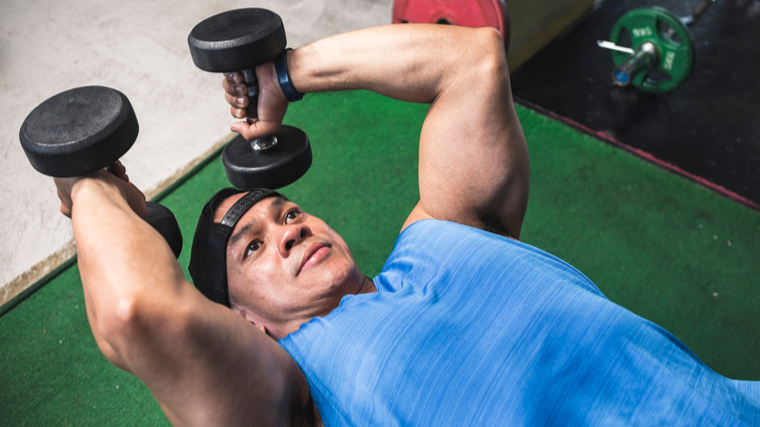
This workout combines heavy loads, extended sets, and intense peak contractions all into one workout. You begin with a heavy lower-rep exercise, followed by exercises using the high-intensity one-and-a-quarter rep technique. The workout finishes with high-tension isolation exercises using high reps coupled with isometric holds in the fully shortened (peak contraction) position.
You will perform this workout in a superset format using a short rest period after the first exercise and a longer rest period after the second exercise in each pair.
Close-Grip Bench Press
- How to Do it: Using a standard flat bench, emphasize triceps recruitment by using a slightly closer grip on the bar. Keep your elbows positioned at a 45-degree angle from your body and don’t allow them to flare out. Note that there is no lockout or pause in any position. Maintain explosiveness coming out of the bottom of the movement.
- Sets, Reps, Tempo: 4 x 6 at 3-0-X-0 tempo.
- Rest time: 60 seconds before moving to the next exercise.
Medium-Grip EZ-Bar Curl
- How to Do it: Grab an EZ-bar with a palms-up grip, setting your hands just outside your hips. Keep your elbows positioned into your rib cage throughout the set. Focus on not letting your elbows move forward or backwards as your lift. Keep your upper arms in place with no internal or external rotation of the shoulders. Maintaining strict form will keep all the tension placed on the biceps.
- Sets, Reps, Tempo: 4 x 6 at 3-0-X-0 tempo.
- Rest time: 90 seconds before returning to the previous exercise.
Decline Dumbbell Skull Crusher
- How to Do it: Position a bench at a slight decline (roughly 20 degrees) and lie back holding two dumbbells overhead with your hands facing each other. Perform each set using the “one and a quarter rep” technique. Lower the weight fully, raise it one-quarter of the way up, return to a fully stretched position, and then return to full lockout. This is counted as one rep. As you lower the dumbbells, fully stretch the triceps by thinking about reaching your arm slightly behind your head.
- Sets, Reps,Tempo: 3 x 8-10 at 3-2-1-0 tempo.
- Rest time: 45 seconds rest before moving to the next exercise.
Incline Dumbbell Curl
- How to Do it: Position a bench at a high incline (roughly 45 to 65 degrees. Choose the higher angle if your shoulder mobility is restricted) and sit fully back with your hips, shoulders, and head on the bench. Begin with the weights hanging straight down. Perform each set using the “one and a quarter rep” technique. Curl both dumbbells all the way up, lower them to a full stretch, curl both weights one-quarter of the way up, and then down to a full stretch. This is counted as one rep. Focus on keeping your elbows in place and don’t allow them to swing forward.
- Sets, Reps, Tempo: 3 x 8-10 at 3-2-1-0 tempo.
- Rest time: 60 seconds before returning to the previous exercise.
Cross-Body Dual Cable Triceps Extension
- How to Do it: Position yourself in a cable station with two high pulleys. Grab the left handle with your right hand and the right handle with your left hand. Take a few steps back to add emphasis to the peak contraction. Bring your elbows in front of your body slightly to line up the cables with each arm. Focus on keeping your upper body stable while allowing your elbows to naturally sit in position. Do not keep your elbows tucked in close to your body. Press both hands down, and once you feel tension in your triceps, focus on maintaining it through the set. Be sure to finish each rep with a two-second isometric hold in the shortened (contracted) position.
- Sets, Reps, Tempo: 2 x 15 at 3-0-1-2 tempo.
- Rest time: 45 seconds before moving to the next exercise.
High-Pulley Dual Cable Biceps Curl
- How to Do it: Position yourself in front of a cable set at eye-level. Grab the handles and take a few steps back until your biceps are almost fully stretched out. Imagine your elbows are sitting firmly on a very high table and do not let them move during the set. Keep your palms supinated (palms facing up), and flex your biceps to bring your palms towards your face. Be sure to use a two-second isometric hold in the shortened (contracted) position.
- Sets, Reps, Tempo: 2 x 15 at 3-0-1-2 tempo.
- Rest time: 60 seconds before returning to the previous exercise.
The Arm Musculature
Building an impressive pair of arms requires training both the biceps and triceps. Neither body part can be neglected when the goal is overall size. In order to optimally train these muscles, it’s important to understand the details of how they perform and how they’re best recruited.
Biceps Brachii
When you flex your biceps in the mirror, you’re actually looking at more than just one muscle. The upper arm consists of two main muscles on the anterior (front) side. Both are responsible for achieving the desired look.
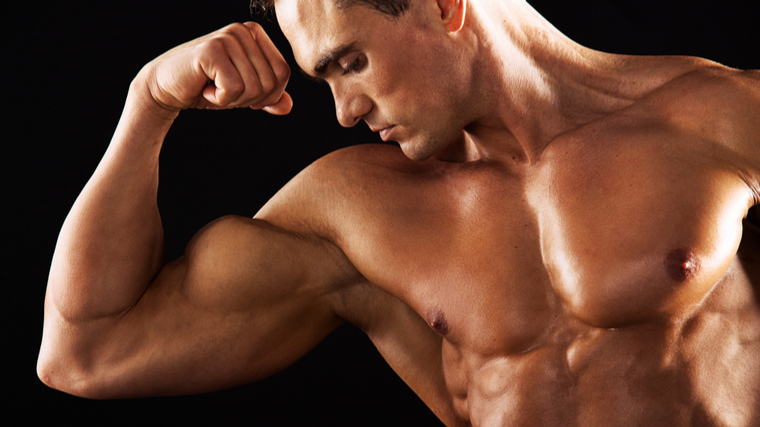
The biceps brachii is what most people consider “the biceps”. It is composed of two heads: a long head commonly referred to as the “outer” and a short head referred to as the “inner.” Both muscle heads originate at the scapulae and insert on the radius bone of the forearm.
Because the biceps muscle crosses both the elbow and the shoulder, it’s worked during the classic curling motion (elbow flexion) and it’s worked during front arm raise movements (shoulder flexion).
Brachialis
The brachialis originates at the humerus bone of the upper arm and inserts on the forearm’s ulna bone. Due to its location, the brachialis isn’t involved in shoulder movement; it only bends the elbow and moves the forearm. Its anatomy also makes it the stronger elbow flexor. (3)
Triceps Brachii
The triceps brachii is the main muscle on the posterior (back) side of the upper arm. The triceps muscle has three distinct heads, each with a slightly different shape and function — the long head, the medial head, and the lateral head.
The long head is located closest to the torso. It can be seen in poses such as the bodybuilder’s classic “front double biceps”. The lateral head, responsible for a triceps’ “horseshoe” shape, is on the outer side of the upper arm and it’s most visible in a “side triceps” pose. The medial head is a deeper muscle, located below the long head, and isn’t often noticeable on the surface.
The primary function of the triceps is elbow extension. All three heads cross the elbow joint and insert onto the ulna bone of the forearm. The origin of the lateral and medial heads are both on the humerus bone of the upper arm. The long head crosses the shoulder joint and originates on the scapula.
This different attachment point is one reason why different triceps heads can be influenced by shoulder and upper arm position during an exercise. (4)
Physical Preparation is Non-Negotiable
It does not matter what muscles you are planning to train — a warm-up is an absolute must. It not only prepares for what is to come physically, but mentally as well.
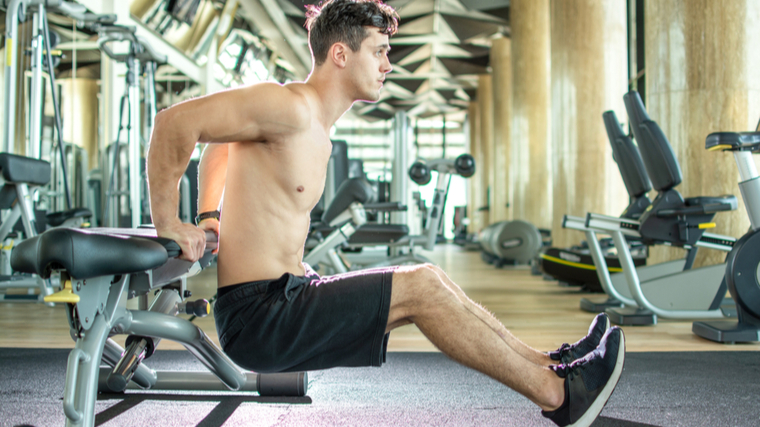
An effective warm-up will have your muscles firing and your nervous system ready to hit the ground running before you start your first working set. Arm workouts, in particular, require warming up the shoulder and elbow joints to train hard without pain.
The Biceps and Triceps Warm-Up Circuit
Perform these exercises back-to-back for three total rounds. Take no rest between each exercise, but take 30 to 45 seconds rest after each full round.
- Push-up: Perform a basic push-up. Take two seconds to lower your body and two seconds to press up. Complete 10 reps.
- Bench Dip: Sit off of the side of a standard flat bench with your feet flat and knees bent. Place your hands on the bench to each side of your hips with your fingers pointed at your feet. Straighten your arms and then lower your hips below bench-level until you create a 90-degree angle with your arms before returning to the top. Complete 10 reps.
- Inverted Row: Use a Smith machine or any sturdy bar set at roughly waist-height. Grab the bar and suspend yourself from locked arms below it. Keep a straight body with only your heels touching the ground. Pull your chest to the bar. Perform five reps with a pronated (palms down) grip and then five reps with a supinated (palms up) grip. If necessary, keep your feet flat and bend your knees to improve leverage and complete the reps with less difficulty. This should be a warm-up, not an intense working set to muscular failure.
Bigger Arms Start Now
Wanting larger triceps and biceps isn’t just for bodybuilders. A workout dedicated to building a set of arms helps to put the finishing touch on any lifter whether their training priority is strength, athleticism, or all-out muscle. Stop short-changing your physique and start adding an arm day to your program.
References
- Moritani T. (1993). Neuromuscular adaptations during the acquisition of muscle strength, power and motor tasks. Journal of biomechanics, 26 Suppl 1, 95–107. https://ift.tt/lyMCJFP
- Schoenfeld, B. J., Ogborn, D., & Krieger, J. W. (2016). Effects of Resistance Training Frequency on Measures of Muscle Hypertrophy: A Systematic Review and Meta-Analysis. Sports medicine (Auckland, N.Z.), 46(11), 1689–1697. https://ift.tt/Ih1LrVv
- Kholinne E, Zulkarnain RF, Sun YC, Lim S, Chun JM, Jeon IH. The different role of each head of the triceps brachii muscle in elbow extension. Acta Orthop Traumatol Turc. 2018;52(3):201-205. doi:10.1016/j.aott.2018.02.005
Featured Image Credit: K-STUDIO / Shutterstock
The post The Best Arm Workouts for Beginners, With Dumbbells, and More appeared first on Breaking Muscle.
source https://breakingmuscle.com/best-arm-workouts/
Comments
Post a Comment